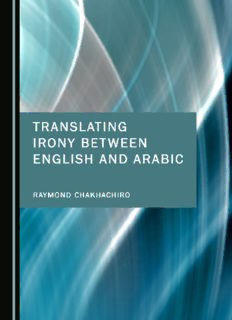
Translating Irony Between English and Arabic PDF
Preview Translating Irony Between English and Arabic
Translating Irony between English and Arabic Translating Irony between English and Arabic By Raymond Chakhachiro Translating Irony between English and Arabic By Raymond Chakhachiro First published by Sayyab Books Limited in 2011 Published 2018 by Cambridge Scholars Publishing Lady Stephenson Library, Newcastle upon Tyne, NE6 2PA, UK British Library Cataloguing in Publication Data A catalogue record for this book is available from the British Library Copyright © 2018 by Raymond Chakhachiro All rights for this book reserved. No part of this book may be reproduced, stored in a retrieval system, or transmitted, in any form or by any means, electronic, mechanical, photocopying, recording or otherwise, without the prior permission of the copyright owner. ISBN (10): 1-5275-0632-0 ISBN (13): 978-1-5275-0632-9 To Denise, Matilda and Ibraaheem CONTENTS Acknowledgements .................................................................................... ix List of Tables, Figures and Charts ............................................................... x Romanisation Conventions ......................................................................... xi Introduction ................................................................................................ 1 0.1 Approach ......................................................................................... 2 0.2 Plan ................................................................................................. 4 Chapter One ................................................................................................. 7 The Contribution of Literary Theory 1.1 Definition of irony ........................................................................... 7 1.2 Views on irony in English ............................................................. 12 1.3 Examples of rhetorical and stylistic aspects of irony in corrective English literature ........................................................................... 26 1.4 Views on Irony in Arabic ............................................................... 30 1.5 Examples of rhetorical and stylistic aspects of irony in corrective Arabic literature ............................................................................. 35 Conclusion ........................................................................................... 41 Chapter Two .............................................................................................. 43 The Contribution of Linguistic Theory 2.1 Irony in pragmatic studies ............................................................. 43 2.2 Irony in satiric discourse ............................................................... 45 2.3 Literary criticism and linguistics .................................................... 47 2.4 Modern linguistics and irony ......................................................... 50 2.5 Towards a theory of inference ...................................................... 69 2.6 Ironic devices and text structure .................................................... 78 Conclusion ........................................................................................... 81 viii Contents Chapter Three ............................................................................................ 84 Translation Theory and the Translation of Irony 3.1 Overview ........................................................................................ 84 3.2 Translation theory in the Arab world ............................................. 87 3.3 Translation process and modern linguistics ................................... 88 3.4 Contrastive analysis and comparative stylistics in the theory of Translation ................................................................................ 92 Chapter Four ............................................................................................ 103 Towards a Model for Translating Corrective Irony in Argumentative Texts 4.1 The structure of argumentative texts ............................................ 103 4.2 Ironic devices ............................................................................... 104 4.3 Discourse model........................................................................... 106 4.4 Functionality of key ironic devices .............................................. 117 4.5 Textual and contextual features of argumentative texts ............... 130 Chapter Five ............................................................................................ 139 Data Analysis 5.1 The data set ................................................................................. 140 5.2 Analysis ...................................................................................... 141 Conclusion ......................................................................................... 247 Chapter Six .............................................................................................. 250 Translating Strategies 6.1 Form, function and translation equivalence ................................. 250 6.2 General translation strategies ....................................................... 275 6.3 Full translation of English texts .................................................. 288 6.4 Concluding remarks ..................................................................... 298 References .............................................................................................. 300 Index ....................................................................................................... 309 ACKNOWLEDGEMENTS My extreme gratitude goes to Stuart J. Campbell for his constant encouragement, guidance and support in the process of writing this work. I would like to also thank George Saunders who made insightful comments on the initial draft of this book and Douglas Muecke for his constructive criticism on the literary chapter. I am indebted to Western Sydney University for the time it has provided me with which made this work possible. I warmly thank Denise Cox Chakhachiro who helped me so much at every stage and patiently read through and commented on every chapter. My thanks also go to George Zantis and Sephen Morse for their feedback on the initial draft of this book. I am heartily thankful to Alya' Al-Rubai'i for her review of the draft and valuable comments and to the founding director of Sayyab Books, Ali Al- Manna’, for his constant support throughout the process of completing this work. Finally, thank you so much to my daughters Elizabeth and Nadia who have provided me with the time and quiet space to complete this project.
Description: